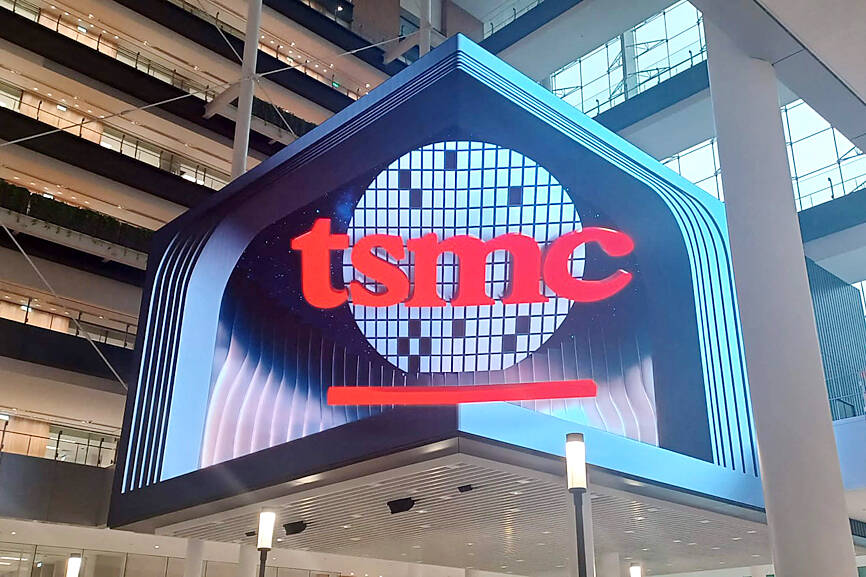Odd lot trades of contract chipmaker Taiwan Semiconductor Manufacturing Co’s (TSMC, 台積電) shares surged on Friday, although the stock faced headwinds, tumbling more than 5 percent in the session, the Taiwan Stock Exchange (TWSE) said.
The volume of odd lot trades of TSMC shares totaled about 9.84 million shares on Friday, up sharply by about 400 percent from Tuesday, in a session before the local stock market closed due to Typhoon Gaemi on Wednesday and Thursday, the TWSE added.
Stocks in Taiwan are usually bought or sold in lots of 1,000 shares. The nation lifted a ban on odd lots during regular trading hours in October 2020 to make it easier for retail investors to buy high-priced stocks in quantities of less than 1,000 shares.

Photo: Ann Wang, Reuters
TSMC on Friday shed 5.62 percent to close at NT$924, but traded above the nearest technical support at about the 60-day moving average of NT$910.00, TWSE data showed.
The heavy losses cut TSMC’s market capitalization by more than NT$1.42 trillion (US$43.3 billion) in one session to NT$23.96 trillion, the data showed.
The volume of odd lot trades of TSMC shares on Friday is the sixth-highest in the chipmaker’s history since its listing on Sept. 5, 1994, TWSE data showed.
The value of odd lot trades of TSMC shares on Friday totaled NT$9.12 billion, the second-highest for the chipmaker, TWSE data showed.
Analysts said the strong buying from retail investors indicated optimism about TSMC’s business outlook.
Odd lots provided investors with a good trading platform to own the stock.
As for iPhone assembler Hon Hai Precision Industry Co (鴻海精密), also known as Foxconn Technology Group (富士康科技集團), odd lot trades of its shares on Friday soared 183 percent from Tuesday to about 3.16 million shares, the seventh-highest in the company’s history since a listing on the main board on June 18, 1991, TWSE data showed.
The value of odd lot trades of Hon Hai, second to TSMC in terms of market value, totaled about NT$609 million on Friday, the fifth-largest for the world’s largest contract electronics maker, the data showed.
The strong buying by retail investors also showed they were willing to pick up bargains after Hon Hai shares tumbled 4.71 percent to end at NT$192, which wiped out its market cap by NT$131.7 billion to NT$2.66 trillion, the TWSE said.

When an apartment comes up for rent in Germany’s big cities, hundreds of prospective tenants often queue down the street to view it, but the acute shortage of affordable housing is getting scant attention ahead of today’s snap general election. “Housing is one of the main problems for people, but nobody talks about it, nobody takes it seriously,” said Andreas Ibel, president of Build Europe, an association representing housing developers. Migration and the sluggish economy top the list of voters’ concerns, but analysts say housing policy fails to break through as returns on investment take time to register, making the

‘SILVER LINING’: Although the news caused TSMC to fall on the local market, an analyst said that as tariffs are not set to go into effect until April, there is still time for negotiations US President Donald Trump on Tuesday said that he would likely impose tariffs on semiconductor, automobile and pharmaceutical imports of about 25 percent, with an announcement coming as soon as April 2 in a move that would represent a dramatic widening of the US leader’s trade war. “I probably will tell you that on April 2, but it’ll be in the neighborhood of 25 percent,” Trump told reporters at his Mar-a-Lago club when asked about his plan for auto tariffs. Asked about similar levies on pharmaceutical drugs and semiconductors, the president said that “it’ll be 25 percent and higher, and it’ll

CHIP BOOM: Revenue for the semiconductor industry is set to reach US$1 trillion by 2032, opening up opportunities for the chip pacakging and testing company, it said ASE Technology Holding Co (日月光投控), the world’s largest provider of outsourced semiconductor assembly and test (OSAT) services, yesterday launched a new advanced manufacturing facility in Penang, Malaysia, aiming to meet growing demand for emerging technologies such as generative artificial intelligence (AI) applications. The US$300 million facility is a critical step in expanding ASE’s global footprint, offering an alternative for customers from the US, Europe, Japan, South Korea and China to assemble and test chips outside of Taiwan amid efforts to diversify supply chains. The plant, the company’s fifth in Malaysia, is part of a strategic expansion plan that would more than triple

Taiwanese artificial intelligence (AI) server makers are expected to make major investments in Texas in May after US President Donald Trump’s first 100 days in office and amid his rising tariff threats, Taiwan Electrical and Electronic Manufacturers’ Association (TEEMA, 台灣電子電機公會) chairman Richard Lee (李詩欽) said yesterday. The association led a delegation of seven AI server manufacturers to Washington, as well as the US states of California, Texas and New Mexico, to discuss land and tax issues, as Taiwanese firms speed up their production plans in the US with many of them seeing Texas as their top option for investment, Lee said. The